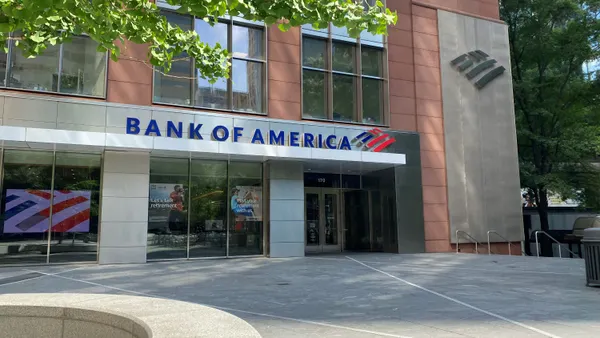Dive Brief:
- The Bank Policy Institute (BPI), Independent Community Bankers of America (ICBA) and the Center for Responsible Lending are asking lawmakers to include a three-year moratorium on new industrial loan company charter approvals in the next coronavirus relief package.
- The request follows the Federal Deposit Insurance Corp.'s approval in March of charters for payment company Square and student loan servicer Nelnet. Japanese e-commerce giant Rakuten and investment company Edward Jones have applications pending. Before this year, the FDIC had not approved a new ILC charter since 2008.
- ILC charters have drawn flak from trade groups and some lawmakers who say commercial companies are exploiting a "dangerous gap" in oversight that allows them to have a banking arm without registering as a bank holding company, thus avoiding Federal Reserve supervision.
Dive Insight:
The proposed moratorium mirrors a temporary freeze on ILC charter approvals that was couched in the 2010 Dodd-Frank Act.
"Congress should not abdicate its duty to address the ILC loophole and allow bank regulators to decide the fate of our banking system," the groups wrote in a letter Wednesday to the heads of the Senate Banking and House Financial Services committees. "While enactment of legislation to permanently close the loophole is preferable, this intermediate action will give Congress the time necessary to approve an appropriate legislative framework."
Opposition to the ILC loophole has been steady since Walmart applied for a charter in 2005, only to withdraw less than two years later. Sen. John Kennedy, R-LA, introduced a bill last year that sought to bar nonfinancial companies from establishing ILCs.
The groups said some of their objection is rooted in timing — i.e., the potential approval of charters during the coronavirus pandemic — and some in principle. They targeted both pending applications by name.
"This company has deliberately chosen the ILC charter over becoming a Bank Holding Company, for which it is qualified, in an effort to skirt Federal Reserve supervision and regulation," the groups said of Edward Jones. "Congress should put a stop to this form of 'charter shopping,' which only weakens consumer protections and heightens systemic risk."
But the advocates leveled their sharpest criticism in relation to the Rakuten bid. The Japanese company filed for an ILC charter last July, then withdrew its application in March before resubmitting it two months later.
"The FDIC lacks the statutory tools to adequately examine and supervise the many e-commerce affiliate relationships, particularly when so many of them operate overseas, at the size and scale of Rakuten," they wrote. "Once Rakuten is permitted to own an ILC, the door is open for other similarly large technology-based commercial firms like Amazon, Apple, and Google to own ILCs as well, effectively changing the landscape and risk profile of the entire banking system, without any Congressional action."
Another regulator Wednesday indicated that the boundaries between banking and commerce have blurred.
"I'm not telling you that I think Walmart should get a charter or shouldn't get a charter, but I think a lot of those old walls have started to come down because of economic reality," the Office of the Comptroller of the Currency’s acting chief, Brian Brooks, said Wednesday, according to American Banker.
"[At] the end of the day, it's customer demand that determines how we receive services. It’s not these magic walls that got enacted in some historical moment," Brooks said.










